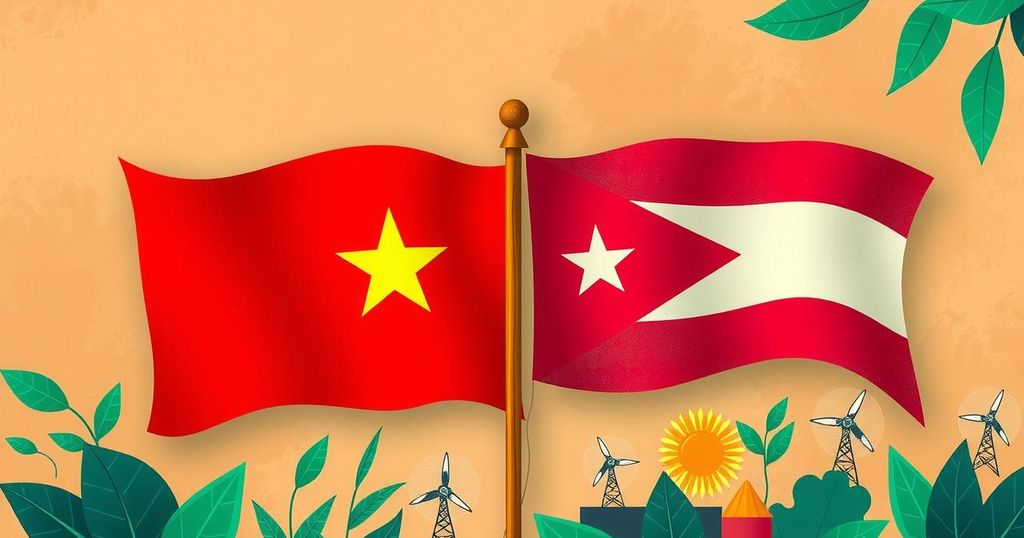The Potential Impact of Hurricane Helene on the Upcoming Presidential Election
Hurricane Helene has inflicted severe damage ahead of the closely contested presidential election, raising concerns about potential impacts on voter turnout and preferences, especially in battleground states like Georgia and North Carolina. Historical case studies indicate that such disasters can sway electoral behavior, primarily depending on the effectiveness of government responses and the demographics of the affected areas.
The impending presidential election is remarkably close, raising the possibility that external factors may influence its outcome significantly. Despite the potential for diverse events such as escalating conflicts in the Middle East or a strike by dockworkers affecting economic perceptions, Hurricane Helene poses a more immediate threat. This storm has already resulted in a tragic loss of life, with confirmed fatalities reaching 175, and damage estimates around $160 billion, marking it as one of the deadliest and most expensive hurricanes in U.S. history. The devastation from Hurricane Helene extends through key battleground states of Georgia and North Carolina, drawing critical attention as the election approaches. The potential effects on voter turnout are substantial, echoing the lessons learned from Hurricane Sandy, which struck just a week before the 2012 election but may not have dampened turnout significantly. In contrast, early voting and absentee ballots are now more prevalent, providing different dynamics for affected voters. Concerns exist regarding flooded polling locations and potential interruptions of mail services. Although these issues could impede voting efforts, there should be adequate time for recovery in advance of the election. Psychological impacts and disruptions to daily life may complicate civic participation, making it challenging to predict turnout accurately. Data indicates that regions most impacted by Hurricane Helene predominantly supported former President Donald Trump, suggesting possible disparities in voting outcomes. According to analyses, counties in disaster-affected areas predominantly favored Trump by nearly 16 points, whereas non-disaster areas leaned towards President Joe Biden. Should the affected counties struggle to participate at previous levels by Election Day, it could shift the electoral balance. Furthermore, the effectiveness of government relief and recovery efforts post-Hurricane Helene will likely influence voter sentiment. Historical significant events, such as the responses to Hurricane Sandy and Hurricane Katrina, illustrate that governmental efficiency during crises can sway public opinion about incumbents. Positive perceptions toward disaster assistance may enhance support for those in power, while mismanagement can lead to unfavorable outcomes in the electoral context. Ultimately, the impacts of Hurricane Helene are unlikely to drastically alter voting behavior unless significant logistical problems arise in the recovery process. Campaigns will need to adapt their voter outreach strategies and show sensitivity towards those affected by the storm, taking care not to exacerbate the trauma suffered by individuals and communities.
Hurricane Helene has caused catastrophic damage across several U.S. states, specifically impacting regions of significant electoral importance for the upcoming presidential election. As elections draw near, the actions leading to recovery and the population’s concerns regarding the government’s response to such disasters hold weight in voting behaviors. Understanding the relationship between natural disasters and electoral outcomes is crucial, particularly in light of historical precedences established during past hurricanes.
In conclusion, while Hurricane Helene has undoubtedly caused widespread tragedy and devastation affecting several critical states, its overall impact on the upcoming presidential election remains uncertain. Factors such as voter turnout, the political tendencies of affected regions, and government response to the disaster will significantly influence electoral dynamics. Candidates must remain cognizant of the situation’s sensitivity and adapt their strategies accordingly to address the needs of their constituents.
Original Source: nymag.com




Post Comment